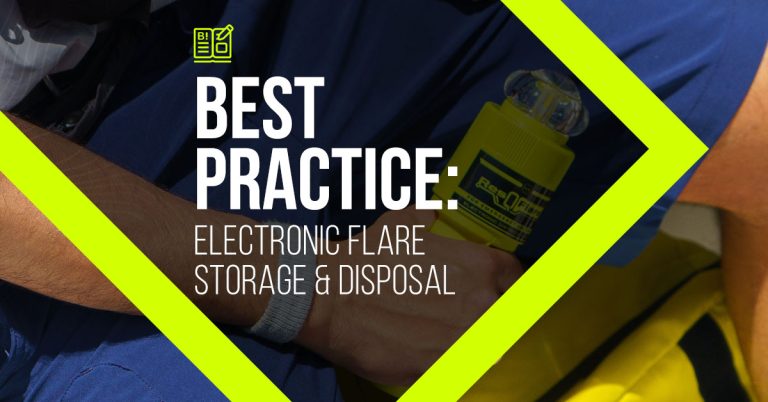
Best Practices for Storing and Disposing of Electronic Flares
Posted on October 14, 2024
Electronic flares are an essential safety device for boaters. These devices provide a long lasting, reliable, and environmentally friendly alternative to traditional pyrotechnic flares, ensuring your safety in emergencies. However, like all safety equipment, it’s essential to take appropriate care of your electronic flares to ensure they are ready for use in an emergency situation. Knowing the best practices for storing electronic flares will help ensure that these important devices are maintained appropriately.
When it comes to disposal of electronic flares, herein lies one of their inherent advantages. Unlike traditional pyrotechnic flares which have an expiry date and corresponding stringent disposal requirements, the electronic flares produced by ACR Electronics have no expiry date and the flares themselves have no special disposal requirements.
In this blog, we’ll explore details on storing and disposing of electronic flares and how this relates to ensuring your safety while also protecting the environment.
Storing Your Electronic Flares
Proper storage of electronic flares helps maximize their lifespan and keeps them in good working order until needed. Here are some best practices for storing them:
- Follow Manufacturer Guidelines
Every electronic flare comes with a manufacturer’s recommendation for storage. Be sure to read the product manual and follow any specific storage instructions regarding temperature, humidity, and location.
- Keep in a Designated Safety Kit
Store your electronic flare in a Ditch Bag, ideally as part of a larger safety kit. The Ditch Bag should be clearly labeled and easily accessible in the event of an emergency. Having all your safety equipment in one place helps ensure quick access when it’s needed most.
- Inspect Regularly
Periodically check your electronic flare for any signs of damage, corrosion, or wear. Look at the expiration date on the batteries installed in the unit and be aware of how long the device will remain effective based on this date. Regular inspections ensure you won’t be caught off guard with a flare that’s ineffective during an emergency. It’s recommended that a set of extra batteries are kept in order to essentially double the operating lifetime of your electronic flare. As such, it’s important to also check the expiry date of the extra batteries and replace them as necessary.
- Avoid Exposure to Extreme Conditions
While electronic flares are built to withstand harsh weather and a harsh environment, long-term exposure to extreme temperatures, humidity, or saltwater can reduce their effectiveness. Store your flare in a location that minimizes exposure to these elements to extend its life.
Disposing of Electronic Flares
As mentioned, electronic flares produced by ACR have no expiry date and no special considerations regarding disposal. Unlike traditional pyrotechnic flares, which can pose environmental hazards if disposed of improperly, electronic flares are more eco-friendly. Although it’s unlikely for the flare itself to have any special disposal requirements, users are encouraged to check local regulations out of an abundance of caution. Additionally, the following should be considered in terms of disposal:
- Remove Batteries
Before disposing of your expired flare, remove the batteries. While some models utilize alkaline batteries which have no special requirements, other models utilize Lithium batteries which require more diligence. Check with local battery recycling programs for proper disposal. Additionally, you can reference guidelines published by the U.S. Environmental Protection Agency (EPA) for disposal of batteries.
- Recycle Electronics
Old electronic flares can be recycled as electronic waste (e-waste). E-waste recycling centers accept old electronics, ensuring they are dismantled and processed in an environmentally responsible manner. Contact your local e-waste facility to see if they accept expired electronic flares.
- Donate for Training Purposes
Some boating safety organizations or emergency response training centers may accept old electronic flares for educational purposes. This can be useful for training new boaters or responders in how to properly use such devices.
Proper storing and disposing of electronic flares is essential for both safety and environmental responsibility. By following these best practices, you can ensure that your flares are ready when needed and that they are disposed of in a way that minimizes their impact on the environment.